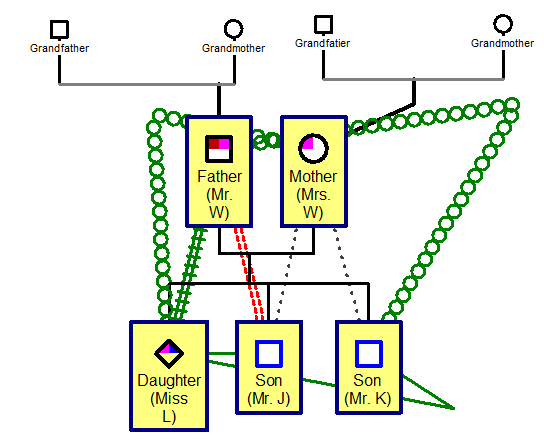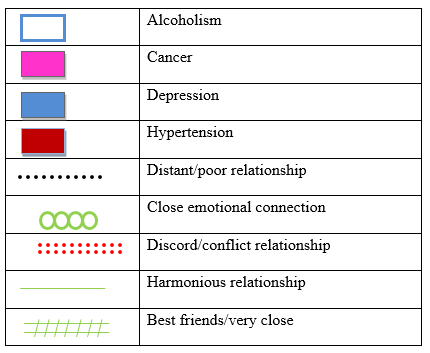The XYZ is a nuclear family consisting of four members. The family comprises a husband, a wife, and three children. Two out of the three children are males. The head of the family is called Mr. W and he is 55 years old. He is the main provider for the family. His wife is called Mrs. W and she is 50 years old. The eldest son is called Mr. J and he is 27 years old followed by Mr. K who is 24 years old. The last born in the family is a daughter called L and she is 22 years old. Mr. W and Mrs. W are of Hispanic descent and currently reside within the region of Saddle Lake.
The family is in the adulthood development stage since all the children are now adults. The parents are united in marriage and have raised another generation of adults, who are almost transitioning to their marriages. The family has been successful in introducing Mrs. Was a member of the family through marriage in the previous stage. From the union of Mr. W and Mrs. W, it has led to the formation of three more members.
From the assessment, Mrs. W confessed that her father had a cancer condition when he was aged. This condition was also present in her grandfather who died of the ailment at the age of 50 years. Currently, it is a serious health concern in the life of Mrs. W, Mr. W, and their daughter. Besides, the hypertension and cancer state of Mr. W and Mrs. W is causing a lot of o stress to their daughter who has the sole responsibility of ensuring that the parents get the best home-based therapy, despite suffering from cancer herself. Using Minuchin’s Structural Family Therapy Model, the following genogram was generated.


Analysis
In analyzing the health concerns of this family, the intervention and diagnosis were done through the DSM-5 model (Akin, Mendi, Ozturk, Cinper, & Durna, 2012). About the XYZ family’s health concerns on cancer and hypertension, the diagnosis involved classifying the type of illness a patient is suffering from through the use of the predetermined diagnostic information that had a range of effects, that is, from mild to acute. The diagnosis was followed by tests that were measured against predetermined results for each stage of the disease to ensure that it had good reliability as indicated in the DSM-5 model (Akin et al., 2012).
The clinical benefit of having very good reliability was to guarantee accurate diagnosis and proper recording of the diagnosis information. The DSM-5 model dwelt on three main building blocks. These building blocks are preventive care, home-based care, and treatment based care (Lewis, 2011). Through these elements, the intervention nurse was allowed to implement the triangular intervention mechanism.
As indicated in Minuchin’s Structural Family Therapy Model, the XYZ family community has both normative and comparative needs. For instance, each individual in the community assessment group has unique medical and psychological needs that are not accommodated by the health and social support centers within the community. Direct nursing intervention as proposed by the change theory will ensure that the normative and comparative needs are addressed sustainably within the acceptable ethics of nursing (Casey & Wallis, 2011).
Reflection
As a therapist, I need to be aware of my ethic, gender, and cultural heritage to successfully execute the proposed therapy. Understanding the values and beliefs of individuals are important for therapists. I need to be aware of my negative and positive reaction to the values and traditions of the clients (Casey & Wallis, 2011). Indeed, this attitude will be a great contribution to the counseling session since the XYZ family fall in the category of high vulnerability.
My beliefs that religion and meditation give people a framework within which to deal with the limitations in life will also be a contribution and something I will think about using in therapy in the XYZ family, especially in promoting holistic management of hypertension through minimizing stressful environment and healthy lifestyle.
I will be able to evaluate my values and goals as influenced by the family XYZ family genogram. For instance, the need to think about others and support each other will improve my sense of self-awareness, when promoting inclusivity as part of the treatment. As a family therapist, I should be aware of my cultural and ethnic heritage to ensure that the beliefs and values of every individual in the family are accommodated. Besides, I should be aware of my positive and negative perceptions toward the heritage and values of clients as represented by diversity within the XYZ family genogram.
Besides, my understanding of religion and other stress relief strategies by relating to the XYZ family tree is necessary towards facilitating crisis management with the clients (Lewis, 2011). Since the ultimate success of family therapy is dependent on how different counseling techniques are applied, I will recognize different views and perspectives to improve on the understanding of clients, their behave, and view of different aspects of life, which are the basic tenets of best practices in clinical therapy work.
References
Akin, S., Mendi, B., Ozturk, B., Cinper, C., & Durna, Z. (2012). Assessment of relationship between self-care and fatigue and loneliness in haemodialysis patients. Journal of Clinical Nursing, 23(5-6), 856–864.
Casey, A., & Wallis, A. (2011). Effective communication: principle of nursing practice. Nursing Standard, 25(32), 35-37.
Lewis, L. M. (2011). Medication adherence and spiritual perspectives among African American older women with hypertension. Journal of Gerontological Nursing, 37(6), 34-41.